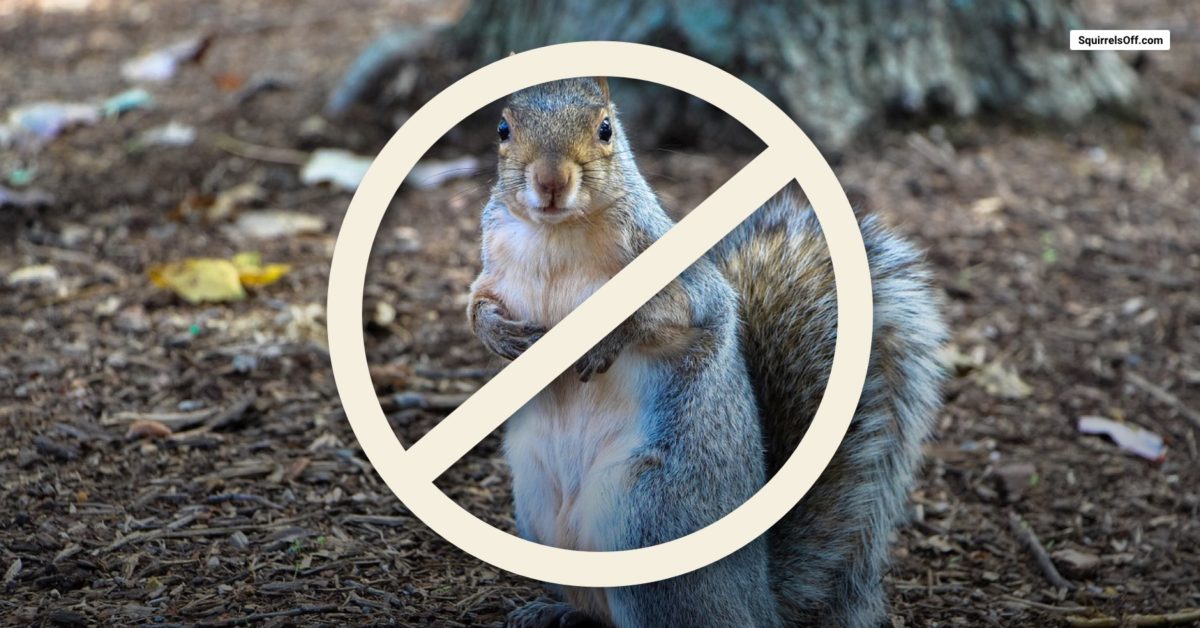Squirrels are known for taking residence up in various attics, homes, and crawlspaces, building nests and more. They also become a nuisance in backyards and gardens, by consuming fruit and vegetables, infiltrating bird feeders and chewing up tree bark. However, there are simple ways to rid your yard of squirrels and prevent them from getting into your house.
1. Don’t Feed Them
Keep in mind, if you feed them they will come. When you leave food in your yard, it becomes fair game for all roaming animals or creatures who already call your property home. Take care not to scatter plant seeds when hanging bird feeders, and throw food scraps into composting bins, to prevent the creation of easy meal opportunities. Bird watching has the potential of attracting pests, especially squirrels, with uneaten bird seed, so you should consider this against how much you enjoy your hobby.
2. Remove all Attractants
Squirrels are lured in by the sight and smell of nuts, seeds, and fallen fruit. This can be easily prevented by regularly raking your yard to remove leftovers from beneath trees and bird feeders. Also, ensure squirrels are unable to access your trash by using garbage cans with tight-fitting lids.
3. Scare Them Off
Dogs and cats may be enough to prevent squirrels from wrecking your yard, especially if your dog enjoys chasing them off. Plastic owls are also helpful if you don’t have a dog when placed around your property on fence posts or even your roof. Containers of predator urine, such as wolf, tiger or coyote urine, can also be obtained and utilized by spraying around your yard and garden. Predator scents scare many animals away, including deer, rabbits, and squirrels. This affordable option is permanent but only needs another application after it rains.

4. Spray Them
Squirrels aren’t particularly fond of getting wet, which provides the opportunity of scaring them off by the use of motion-activated sprinkler systems.
5. Exclude Them
Prevent entry by blocking off a squirrel’s favorite entry point into your yard. You may block their route along utility wires by installing two-foot sections of plastic pipe onto non-electrical wires. When you slit the pipe lengthwise and spread it open over the wire, it creates a tightrope situation that tosses the squirrel to the ground. Once they step onto the pipe, it simply spins around the wire preventing any stability for a pesky squirrel to utilize.
6. Deter Them
When you’ve been unable to keep ground squirrels out of your yard, you may consider using squirrel baffles around trees and plants. Consider installing a 2-foot wide metal collar around the trunk of your trees, at least 6 to 8 feet off of the ground. Squirrel baffles may also be installed onto feeder poles to keep the seed safe. Additionally, you can cover your plants in netting, or surround them with fencing. A simple fence can be built out of one-inch mesh wire and should be 30 inches high, extending 6 inches underground to prevent burrowing. Electric fences may be a further deterrent, especially when used in a pair at least 3 inches from an existing fence, 6 inches above the ground. Small pieces of plastic bird netting may be cut and wrapped around ripening fruit. Heavyweight mulch, in addition to stones and decorative rocks, may be placed on the surface of the soil to keep squirrels from digging out flowerpots.
7. Repel Them
Seeds, bulbs, and flowers may be treated with a taste repellent, such as capsaicin, or commercially available chemical repellent. These substances may need to be reapplied once it rains. Repellents shouldn’t be used on any product you plan to eat, such as fruits and vegetables. Mint may also be planted along the edge of your garden, as squirrels avoid the scent of peppermint plants.
8. Plant Flowers Squirrels Hate
Squirrels dislike the flavor of certain flowers, such as allium, hyacinth and snowdrops Daffodils also contain a toxin that renders them inedible to all mammals, which makes them another type of deterrent. Planting these bulbs in the springtime serves as a deterrent in the future, once they grow and bloom.
9. Trap Them
While the idea of trapping live squirrels to rid your yard of these pests may seem like an easy solution, it often only helps temporarily. Generally, more squirrels arrive to quickly take the place of trapped squirrels. Most states consider squirrels a game species, and they’re protected by various wildlife or hunting laws. Depending on your location, trapping may be considered illegal. Check with your state’s Department of Fish and Wildlife, to further inquire about laws within your area.
10. Keep Them Out of Your Home
When you notice issues with squirrels in your backyard, it’s generally a sign of bigger problems such as squirrels in your home. Inspect the exterior of your house, by checking for damage around the roof, eaves and exterior walls of the structure. Squirrels utilize holes as points of entry and exit, storing food from your yard within their nests. Promptly repair any and all holes to prevent squirrels from creating multiple entries.
Check the best squirrel proof bird feeder here.
Determine the level of activity throughout your yard, to better asses the methods in which you may rid your property of squirrels. Golf ball-sized, or smaller, holes in flower beds, as well as bite marks on fruit and vegetables in your garden or missing plants and tree bark are all the result of squirrel damage. There are multiple steps, listed above, in which you may prevent squirrels from infiltrating your yard and causing further damage. Squirrel infestations can lead to damage extending beyond your garden, and prevention is the best method in keeping them out of your home by controlling those in your yard.
- 10 Ways to Squirrel Proof a Bird Feeder - February 7, 2020
- How to Keep Squirrels Out Of Bird Feeder - January 2, 2020
- How To Get Rid Of Squirrels - January 1, 2020

